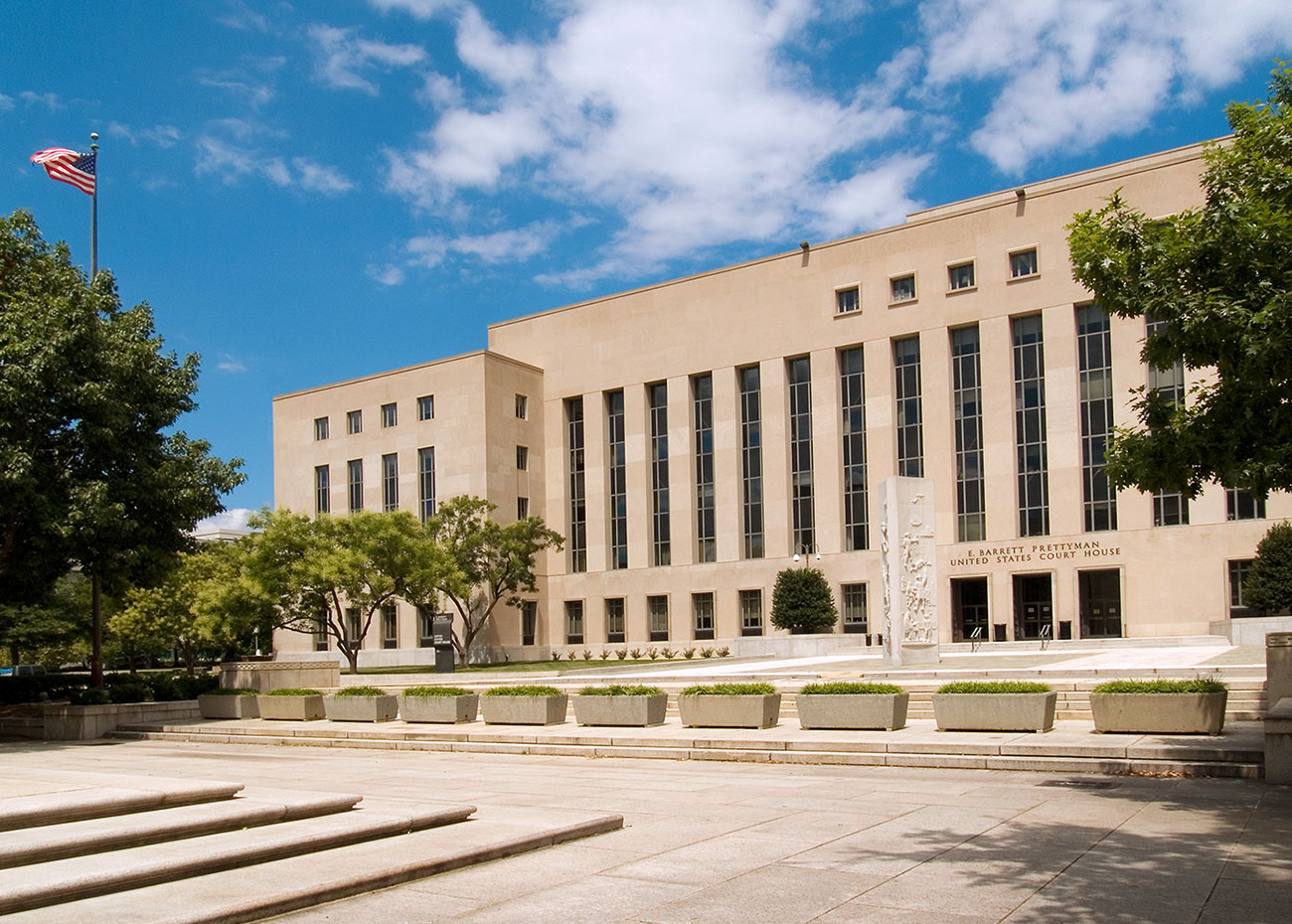The Case Against Unbounded Delegation in Trump v. V.O.S. Selections

On Nov. 5, the Supreme Court will hear argument in Trump v. V.O.S. Selections. The Court will address two questions: whether President Trump had authority under the International Emergency Economic Powers Act (IEEPA) to issue tariffs against Canada, China, and Mexico on Feb. 1, and “reciprocal tariffs” against nearly all U.S. trading partners on April 2; and, if so, whether IEEPA constitutes an unlawful delegation of legislative authority.
The case turns on whether IEEPA, enacted shortly after the National Emergencies Act of 1976 (NEA), confers tariff authority on the president and, if so, what the president’s scope of action is under the statute and the Constitution. In the absence of any intelligible bounds in the statute itself—and any realistic way to check the president following the Court’s decision to strike down the legislative veto (present in the NEA and applicable to IEEPA emergencies) in Immigration and Naturalization Service v. Chadha—IEEPA violates the Constitution’s nondelegation doctrine. As we have suggested in previous articles and one of us has argued in an amicus brief in the V.O.S. Selections case, the Court should address the delegation issues inherent to IEEPA.
Here, we address an important position shared by several noted academic commentators—sometimes called “foreign affairs exceptionalism”—that nondelegation strictures have little to say about congressional grants of authority in the foreign affairs context. This view is based in part on functional considerations that presidents have access to superior intelligence on the underlying issues, need flexibility to deal with unforeseeable events, and must act under the shield of confidentiality. It also, however, draws essential and continuing sustenance from Justice George Sutherland’s opinion for the Court (Justice James McReynolds dissented without opinion and Justice Harlan Stone did not participate) in United States v. Curtiss-Wright Export Corp.
In that opinion, the Court declared that when the president acts in matters of “external affairs,” especially with congressional authorization, the history of congressional delegations in this arena would have to be wholly disregarded to find a constitutional defect in the delegation involved in the statute before it. The Court’s language may, technically, have been dicta as the statute in Curtiss-Wright easily satisfied the conditional-legislation test upheld in Field v. Clark. It nevertheless has been, and remains, highly influential.
We write here to unpack this “historical gloss” argument in Curtiss-Wright. Justice Sutherland’s opinion catalogued a number of statutes that “either leave the exercise of the power to his unrestricted judgment or provide a standard far more general than that which has always been considered requisite with regard to domestic affairs.” Despite this assertion, these laws involved fairly narrow delegations, particularly when compared to IEEPA. The laws identified by Sutherland indeed exemplify defined limits on foreign affairs delegation—namely, limits on the duration of the delegations or the goods or locations that could be targeted. Consequently, the Supreme Court should not take the Curtiss-Wright case as upholding the kind of unbounded delegation authority claimed by Trump’s invocation of IEEPA.
Sutherland discussed nine statutes in the text of the Curtiss-Wright opinion, and another 24 statutes in a footnote, all of which we have separated into categories based on the kinds of limits they impose; Sutherland did not address the Trading with the Enemy Act (TWEA; IEEPA’s predecessor statute) even though a version of the TWEA was in operation at the time of the case. Consequently, we do not address the TWEA here. Instead, we note that the original version of the TWEA was limited to use during wars and consequently may not raise the same concerns as later amendments to the TWEA or those present in IEEPA.
Time-Limited Delegations
The early foreign affairs delegations concerned embargoes enacted by Congress. All of these delegations involved a durational limitation; Congress used a mixture of explicit and implicit time limitations when enacting these statutes. Congress enacted explicit limitations by adding a sunset clause requiring new legislation and enacted implicit limitations by linking the law to an underlying embargo statute that included a sunset clause. Additionally, many of the delegations in these time-limited laws permitted the president to suspend portions of the statutes under specified conditions.
Explicit Time Limitations
The Act of June 4, 1794 is the earliest example of an express time-limited delegation. Although the statute itself is short and sometimes characterized as a “delegation of remarkable power” because the statute authorized the president to “lay an embargo on all ships and vessels … under such regulations as the circumstances of the case may require, and to continue or revoke the same, whenever he shall think proper,” the powers delegated by the statute could “not be exercised, while the Congress of the United States [was] in session” and any embargo laid would “cease and determine in fifteen days from the actual meeting of Congress.” In practice, this meant the delegation operated for only a little over 5 months, since Congress started its second session on Nov. 3, 1794.
Similar time limitations were present in the Act of June 13, 1798, which created a “partial restriction” on trade with France rather than a “general embargo” in the lead-up to the Quasi-War (1798-1800) and authorized the president “to remit and discontinue the prohibitions and restraints” on commerce with France under certain conditions. This statute was scheduled to terminate at “the end of the next session of Congress,” which resulted in an approximately 10-month-long delegation. Likewise, the Act of Feb. 9, 1799—another partial embargo of France that granted the president authority to “remit and discontinue” the embargo provisions under certain conditions—was scheduled to expire on “the third day of March, in the year one thousand eight hundred” resulting in a delegation of approximately 13 months in duration. The Act of Feb. 27, 1800 enacted further restrictions on commerce with France with similar authority for the president to “remit and discontinue” the provisions. This statute was scheduled to expire on “the third day of March, one thousand eight hundred and one,” resulting in a delegation operative for approximately one year. The Act of Feb. 28, 1806 placed a partial embargo on “the island of St. Domingo,” with similar “remit and discontinue” provisions for the president, and was scheduled to last for only “one year, and no longer.” Of similar import, see the Act of Dec. 19, 1806 (a bit more than 5 months); the Act of April 22, 1808, which authorized the president to suspend the Embargo Act of 1807 “during the recess of Congress”; and the Non-Intercourse Act of 1809, which embargoed both Great Britain and France and authorized the president to suspend the embargo as to whichever country “shall cease to violate the neutral commerce of the United States” (a little over a year).
Even though the Act of March 3, 1805 involved a narrower subject matter than countrywide embargoes, the statute still had a durational limit and was scheduled to last “for the term of two years, and from thence to the end of the next session of Congress, and no longer.” Another similarly narrow statute was the Act of March 3, 1817, which prohibited the importation, using “any foreign vessel” of “plaster of Paris … [from] any country, or its dependencies, from which the vessels of the United States are not permitted to bring the same article.” This measure authorized the president to suspend this prohibition as to any country that “shall discontinue such regulations” of its own. This statute was scheduled to “continue and be in force [for] five years.”
Implicit Time Limitations
Several statutes included implicit time limitations, though this was less common. These limits were implicit because the delegation was based on a separate statute that included a time limit. The Resolution of May 7, 1794 is one such statute. This resolution authorized the president to grant clearances “to any ship or vessels belonging to citizens of the United States, which are now loaded, bound from any port in the United States, for any port beyond the Cape of Good Hope.” Although the resolution itself did not have any time limitation, it provided an exception to the embargo imposed by the Resolution of March 26, 1794, thus containing an implicit time limit. That embargo was scheduled to expire on May 25, 1794. Consequently, the delegation afforded by the Resolution of May 7, 1794 was operative for only 18 days. Likewise, the Act of March 3, 1795, which authorized the president “to permit the exportation of arms, cannon and military stores, the law prohibiting the exportation of the same to the contrary notwithstanding,” lacked an explicit time limitation. The “law … to the contrary” mentioned by this statute, however, did contain an explicit time limitation and was scheduled to expire after “the term of one year.” That term ended on May 22, 1795, and consequently, the delegation afforded the president by the Act of March 3, 1795 was operative for a little less than 3 months.
Suspensions
Finally, the Act of May 1, 1810 authorized the president to suspend certain portions of the Non-Intercourse Act of 1809 with either France or Great Britain should either of them “cease to violate the neutral commerce of the United States.” This statute lacked an expiration clause; however, the president’s power to suspend portions of the Non-Intercourse Act of 1809 required France or Great Britain to cease violating the United States’s neutral commerce prior to “the third day of March next,” creating an implicit time limitation of approximately 10 months for this delegation.
Location-Limited Delegations
The second limitation category is limited or targeted locations. Several of the statutes discussed in the previous section had location limitations by virtue of being embargoes against specified locations. Besides embargo statutes, the delegations with limited locations fit within two subcategories: trade-reciprocity statutes and treaty-implementation measures.
The trade-reciprocity statutes follow one of two formats. The first format repealed specified tariff statutes with the caveat that the repeal becomes effective on a country-by-country basis only when foreign countries repeal similar tariffs on the United States. The second format authorized the president to exempt countries from certain tariffs (without repealing the tariff itself) should other countries repeal equivalent tariffs they have on the United States, or in some cases to raise tariffs to meet foreign tariff rates. The statutes that fit the first format are the Act of March 3, 1815, the Act of Jan. 27, 1824, the Act of May 24, 1828, and the Act of May 31, 1830. The statutes that fit the second format are the Act of July 13, 1832, the Act of June 26, 1884, the Act of June 19, 1886, the Act of July 24, 1897, and the Act of June 17, 1930. One minor exception to these formats is the Act of March 3, 1851. which followed the second format but dealt with international postage rates rather than tariffs.
The treaty-implementing statutes all follow the same general pattern. The statute authorized the president to determine when the partner(s) to the underlying treaty had enacted laws to implement the treaty on their end. After such a determination, the president was to issue a proclamation stating such a determination was made, at which point the treaty-implementing statute would automatically come into force.
The one variation on this pattern are treaty-framework statutes. These statutes lack an underlying treaty and instead contemplate a future treaty or treaties that will cover a certain issue or meet certain criteria. The statutes following the standard pattern are the Act of Aug. 5, 1854 (implementing the Elgin-Marcy Treaty), the Act of March 1, 1873 (implementing the Treaty of Washington), the Act of Aug. 15, 1876 (implementing the U.S.-Hawaii Reciprocity Treaty of 1875), the Act of Dec. 17, 1903 (implementing the Commercial Convention of 1902 [between the United States and Cuba]). The statutes following the treaty-framework pattern are the Act of June 11, 1864 (framework for treaties governing jurisdiction of maritime controversies) and the Act of Feb. 21, 1893 (framework for treaties protecting fur seals in the Pacific Ocean).
Toward the end of the 19th century, Congress returned to embargo-style delegations, but without the durational limits of the earlier period. Instead of time limitations, these statutes included more detailed conditions and restraints on the circumstances under which the delegated authority could be exercised. The Act of March 3, 1887 effectively granted a limited embargo power to the president to use against “the British dominions of North America,” providing three specific situations in which the president could exercise this power. Similarly, the Act of July 26, 1892 granted a limited embargo power to the president “to suspend … for such time and to such extent (including absolute prohibition) as he shall deem just, the right of free passage through the Saint Marys Falls Canal” whenever “the passage through any canal or lock connected with the navigation of the Saint Lawrence River, the Great Lakes, or the water ways connecting the same … is prohibited or is made difficult or burdensome by the imposition of tolls or otherwise.” The embargo would apply only to the Dominion of Canada, the country burdening the navigation of these bodies of water. The Act of Sept. 8, 1916 (besides implementing an income tax) provided several circumstances under which the president can effectively issue an embargo. The statute described the conditions in detail, including reciprocal trade prohibitions and whenever during a foreign war one of the belligerent countries subjected U.S. trade to “unreasonable prejudice, disadvantage, injury, or discrimination.”
One statute substantively does not fit well into any of the above subcategories but shares similarities with several of them. The Act of March 23, 1874 authorized the president “to suspend the operations” of the Act of June 22, 1860 (providing for judicial functions in certain countries where U.S. citizens resided or conducted business), whenever he “shall receive satisfactory information that the Ottoman government, or that of Egypt, has organized other tribunals on a basis likely to secure to citizens of the United States, in their dominions, the same impartial justice which they now enjoy there under the judicial functions exercised by the minister, consuls, and other functionaries of the United States.” Like other measures previously discussed, this law permitted the president to suspend the operation of an underlying statute if specific countries took specific actions. Although there is no underlying treaty, this statute was limited to specific countries and involved a narrow issue (judicial functions or tribunals).
Limited or Targeted Goods Delegations
The third and final limitations category is limited or targeted goods. Although some delegations in the previous categories included limitations as the goods impacted, this category did not come to the fore until the end of the 19th century. These statutes dealt exclusively with the exportation of war materials to countries actively or soon to be engaged in war. These statutes were the Resolution of April 22, 1898, the Resolution of March 14, 1912, and the Resolution of Jan. 31, 1922.
The earliest foreign affairs delegations uniformly contained a durational limit, either explicitly or implicitly, and dealt almost exclusively with embargoes. The mid and late 1800s saw a pattern of enacting delegations without a time limitation for the purposes of decreasing tariff and trade barriers on a bilateral basis with other countries. The president’s role in such schemes was to determine when foreign nations eliminated their barriers to U.S. commerce, at which point the U.S. barriers toward that country would also be eliminated by operation of statute. Congress gave further factfinding roles to the president regarding treaty implementation, with several statutes in the mid to late 1800s authorizing the president to determine when various treaty partners had put treaties into effect, at which point the treaty would automatically go into effect and be implemented in the U.S. by operation of statute. Toward the end of the 1800s, there was a return to more embargo-oriented statutes, but without explicit time limitations. The most broadly worded of these statutes was the Resolution of April 22, 1898, yet even this statute was limited to “coal or other material used in war.” Consequently, it is clear that even though the strictness of regulations on foreign affairs delegations may have waxed and waned between the early 1800s and the early 1900s, a limitation as to goods, location, or duration was always present in these foreign affairs delegations.
***
If the statutes discussed or cited in Curtiss-Wright are any guide, the view—embraced by many academics—that congressional delegations in the foreign affairs arena are essentially free of constitutional nondelegation strictures should be reexamined; the history of congressional delegations does not support this view. Moreover, with respect to the Trump tariff litigation now facing the Supreme Court, IEEPA emerges as far and away the outlier among such delegations and should be recognized as a violation of the Constitution’s nondelegation principles.


.jpg?sfvrsn=ab792c7_4)



